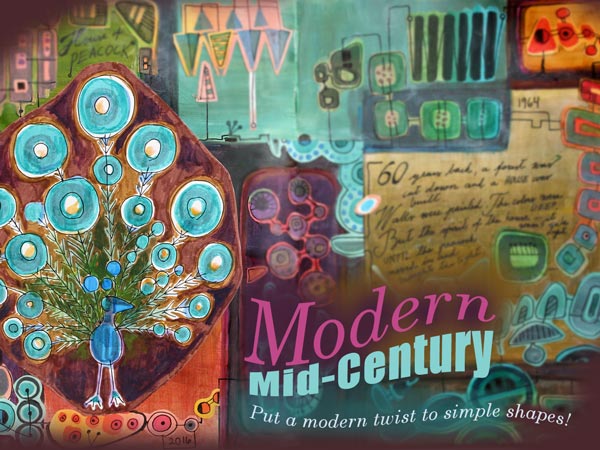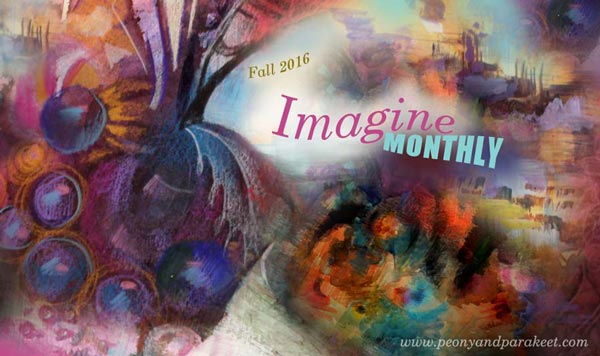What to Create from Simple Shapes? 6 ideas
When I catch myself building a visual image in my mind, I say to myself that my hands have to process the idea first. The idea can be a decorative design or a new painting or anything visual. When my mind is vigorously trying to create images that I would be happy with, my hands don’t understand my mind at all. My mind is a fool and my hands are ruthless.
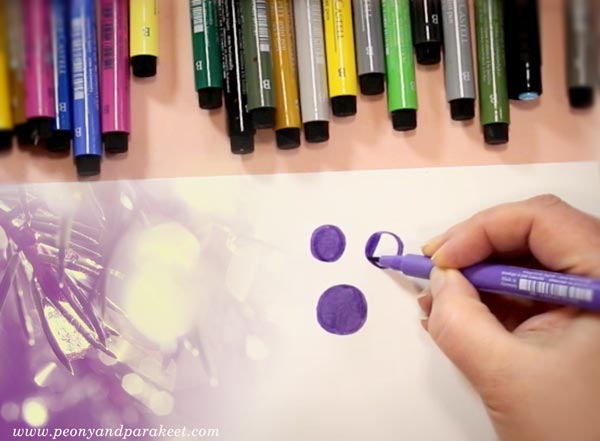
In my mind, I can easily miss the elements that are needed for building the beautiful image. If I imagine a scene, the details that make the scene look so wonderful, are not all there. My mind only has a glimpse. The connection from the mind to the hands feels easier if it’s the other way around. The hand draws a couple of circles and the mind gets creative with them. This way building the bridge from my mind to my hands seems to work much better. Big pictures, personal stories, attractive designs are not born in my mind first. They are born in a conversation that is led by my hand drawing with pen on paper.
But hands don’t decide when to get started, the mind does. This is why I will give you few ideas to start the conversation between your hands and your mind. Like this, this and this post, this blog post is illustrated by my students. The art journal pages that you see here have been made at Modern Mid-Century art journaling class.
1) Build ornaments by grouping simple shapes.
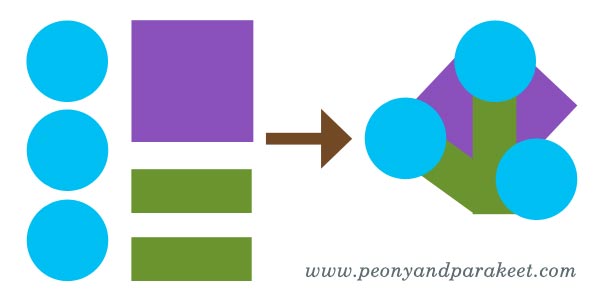
Nel Wisse has created colorul clusters and then grouped them to bigger ornaments.

2) Create a surface pattern and cut a shape from it.
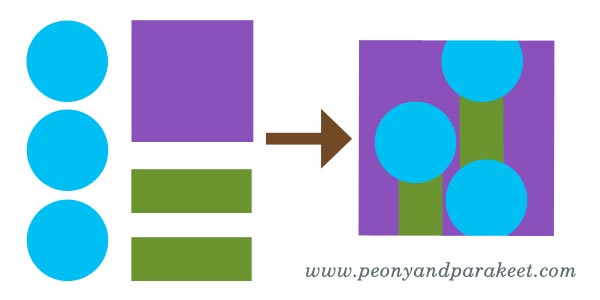
For example, see Darci Hayden’s cat and the stairs! Shapes that include patterns look always fascinating. (More patterned paper ideas)

3) Play with Sizes and Layers
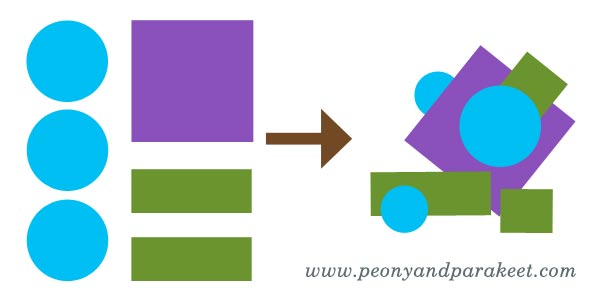
Cut some elements smaller and add dimension to your page by playing with layers.
Sue Jorgensen has a good variety of both large and small elements.
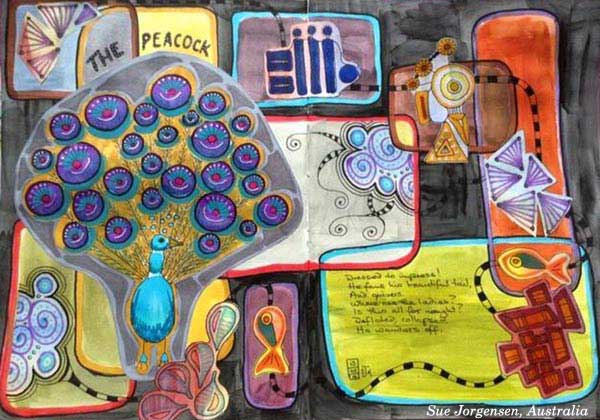
4) Build a map, a house or a room plan
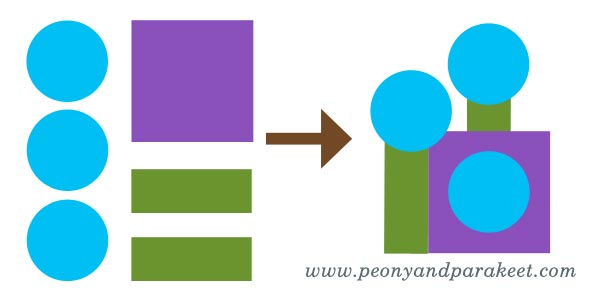
A clear hierarchy between the elements pleases also your left brain.
Marie Jerred’s fox is in the middle of an adventure!
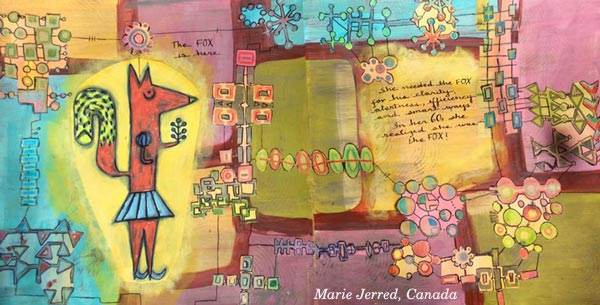
Stephanie Carney’s Flamingo is just entering a house of dreams.

5) Express Micro or Macro World
Both micro and macro biology deal with basic shapes. Explore either molecules or satellites!
Susan Prothero’s micro world is captivating.

Elise Tobler‘s space is full of life!
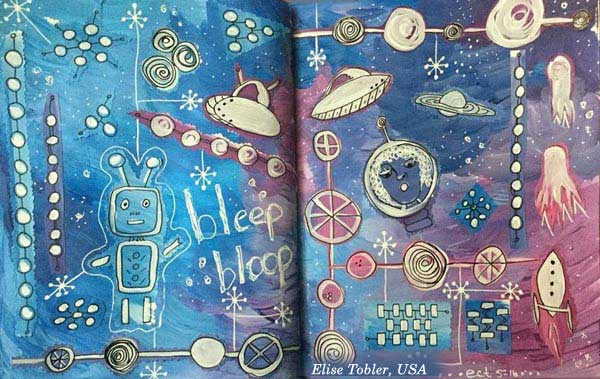
6) Find a connection to a story
Explain what you associate with the shapes and then move on to a more illustrational approach. Elaine Wirthlin’s spread is an awesome example!

Buy the class: Modern Mid-Century!
Designers in 1950s and 1960s (like Annikki Hovisaari from Finland and Lisa Larsson from Sweden) truly knew how to play with simple shapes. Modern Mid-Century is a self-study art journaling class where I am inviting you to my living room and showing inspiring examples from the middle of the 20th century. Then I will help you to design your own unique motifs and build a collage that is both decorative and expressive.
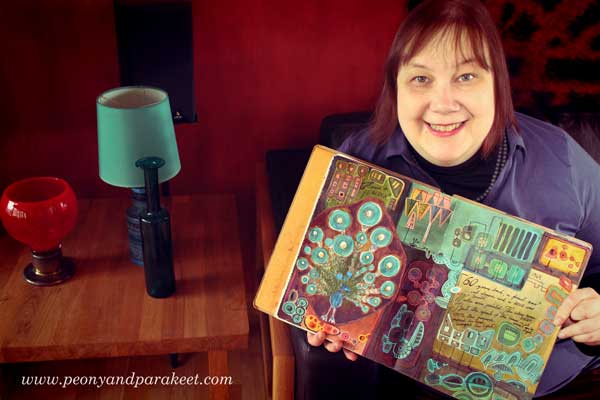
Modern Mid-Century
Start playing with simple shapes! >> Buy Now!
Have Some Vincent van Gogh in Your Life!
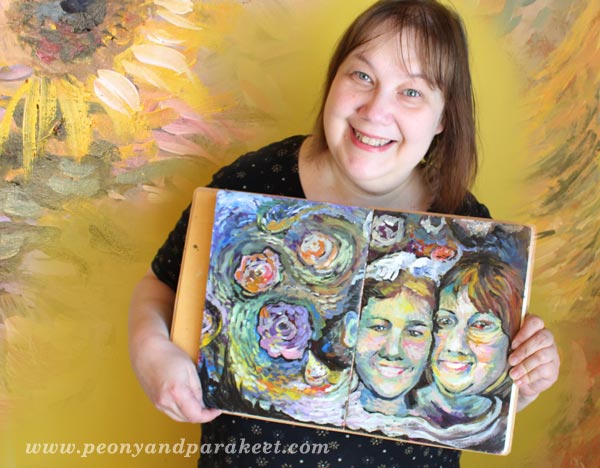
When I opened Imagine Monthly Fall 2016 art journaling class for registration, my question to the first participants was: “What is your favorite artist?” The ultimate winner was Vincent van Gogh. So I went to the local library and picked up two huge books showcasing all his paintings. I wanted to create a class that inspires not only playing in his style, but which also makes people relate to him. I wanted to enable people to put their world next to his and see it in full color like he did.
Life in Full Color
Whether you are an actual engineer or not, I think that you too have an inner engineer. She likes the home to be organized and clean. She takes responsibilities seriously. She worries over the practical stuff.
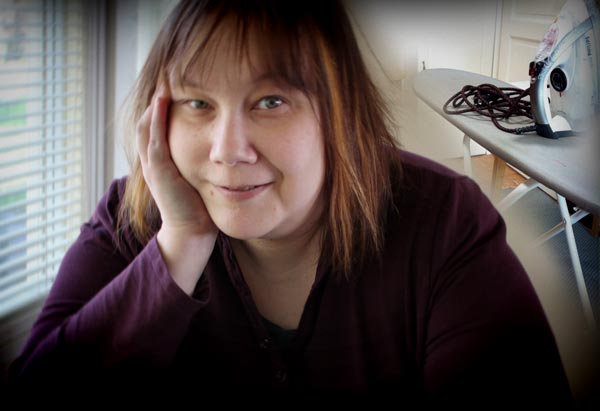
But then, truly, you also have an inner artist. She doesn’t care what time it is or whether she’s hungry or not. She doesn’t have a clue if somebody needs her to be somewhere else. Her world has no linear time. She has no other duties than to explore. She sees colors and textures when the engineer sees dirty laundry and a shopping list. No, she would not stay alive without the inner engineer. But the inner engineer could never live the life in full color without the inner artist.
Vincent van Gogh
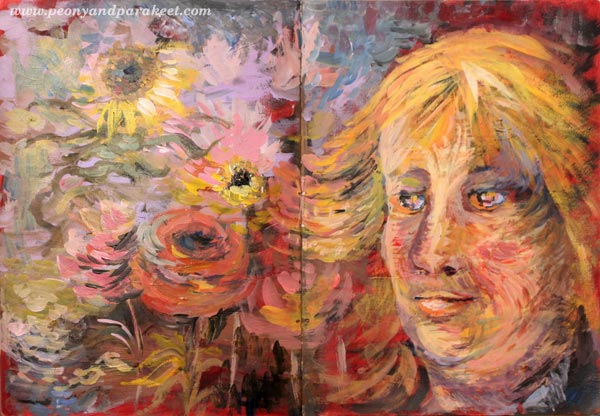
Here’s what every inner engineer knows about Vincent van Gogh: He was a poor artist from the 19th century, painting with thick medium. He had mental issues and he sold only one painting.
But the inner artist feels that he was her soul-mate. He saw the yellow sky and blue ground when other people saw the perfect weather to sow the seed. He saw glorious sunset when other people saw withering flowers. For people of that time, his portraits and sketches looked clumsy even if he had caught the essence. Namely, in his world, the essential thing to do was not to engineer but to express. Instead of aiming for objectivity, he was the master of subjectivity.
Van Gogh Moments

I believe that most people create art because they need “Van Gogh Moments”. In those moments, you can pick any color for any object, not only green for the grass like the inner engineer would suggest. In those moments, you can not only play with colors but also experience the interaction between the hues and shades. Just like van Gogh did! If you look at any detail in his paintings, you will see the interaction of colors.
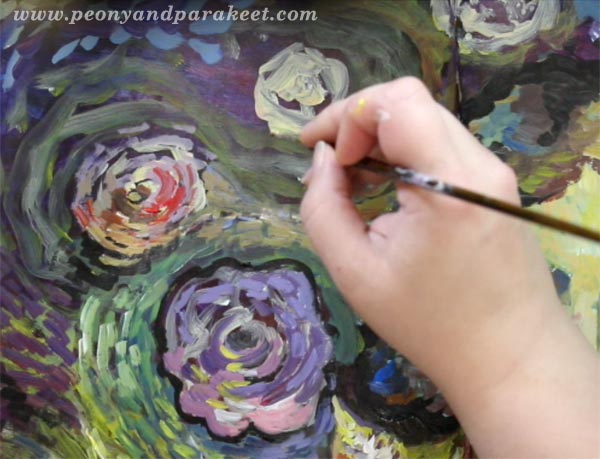
So while the inner engineer waits for the important phone call, the inner artist hears her colors speaking. While the inner engineer worries if she will ever meet someone again, the inner artist paints him or her right there beside her.
Selfie Fantasy
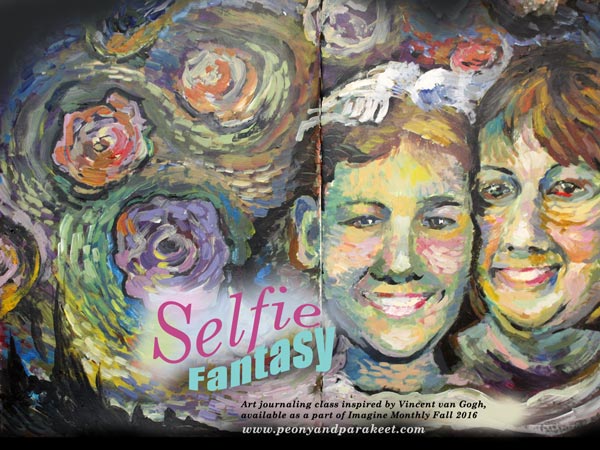
When I browsed through the two big books of van Gogh’s paintings, I realized that a big part of his production was portraits. They were either self-portraits or portraits of other people. So in Selfie Fantasy, you will not only learn easy ways to create a colorful and swirly scene in Vincent van Gogh’s style. You will also get step-by-step instructions for adding some familiar faces onto your art journals. In the class video, I use those methods to paint my mother and me. My mother is there on the spread, glowing on her wedding day, much earlier than when I was born. This time she is in the foreground because in real life she was always the one in the background, supporting my creativity. She truly was my inner engineer until the day she passed away about 25 years ago.
Give some “Van Gogh Moments” for your inner artist!
Sign up for Imagine Monthly Fall 2016
and get an immediate access to Selfie Fantasy – Sign up now!
8 Style Tips from the Students of Peony and Parakeet
This spring, I have seen gorgeous pieces of art made from the mini-course Flowing Greenery. Like in the previous blog post, I want to share some of them with you.
Various Styles with Style Tips
This time I show pieces that are very different in style. I also include style tips and analysis. This kind of comparison can be positive and beneficial. By creating similar work and then comparing it with other artists’ pieces can make you understand more about your own signature style.
1) Warm and Dominant
The first piece is by Terttu Laitinen. Her way to use visually heavy elements feels like a weighted, warm blanket that you want to snuggle into! This piece makes you stop and calm down and still feel inspired! It’s so loaded with energy that the fruits could drop down at any moment.

2) Detailed and Holistic
Gina Meadows takes a step away and makes you think about your life as a whole. It feels like every element in her work has a designated mission, connected to the cycle of living. Her strokes are clearly defined, but living and expanding as she uses very few straight lines.
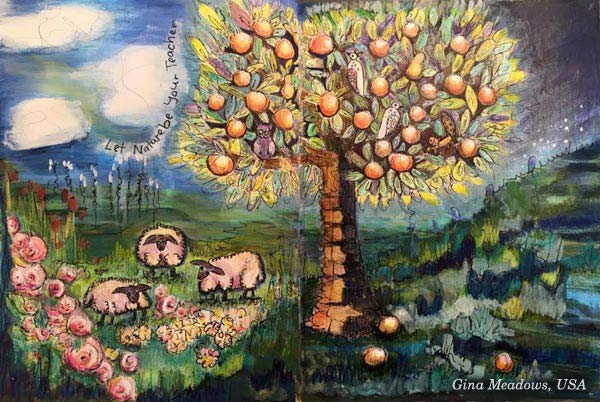
3) Playful and Social
Michelle Rydell combines round strokes with angular ones very playfully. It looks like every little leaf and cloud has a personality of its’ own. She is also a master of combining imagination with visual clarity. A clear focus looks always appealing.
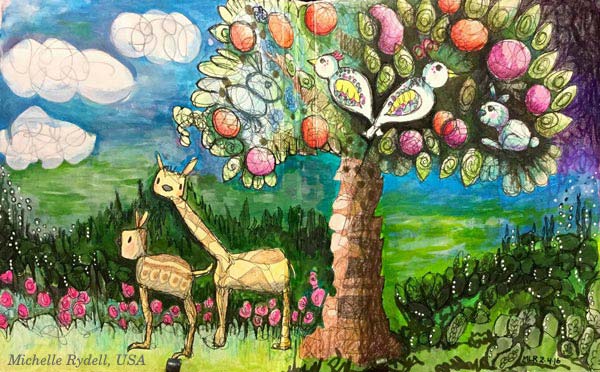
4) Intimate and Symbolic
Terry Whyte‘s work is more intimate. It’s like the tree protects the like-minded couple. A lot of care and thought has been put into shapes of each element to make them look both aesthetic and meaningful.
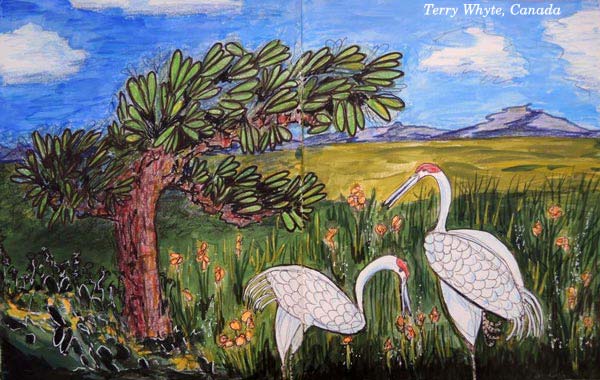
5) Primitive and Mysterious
Ulla M. Holm combined William Morris with Henri Rousseau. Her own unique style goes perfectly with Henri Rousseau’s naive masterpieces. This is an insight that’s worth pondering: how could you combine your favorite artists so that they enrich your own unique style?

6) Decorative and Sophisticated
Patricia Bush has an eye for details. But she also knows how to make them differ in size and color so that the result doesn’t overwhelm you. You might stare the gorgeous pegasus first, but take a look at the trunk of the tree too. It’s wonderfully ornamental and has a very wooden feel. Sophistication in every detail, including the castle and the moon, is her magic!

7) Relaxed and Emotional
Meri Andriesse’s style goes to other direction. Her relaxed piece is more than all the careless elements together. Her strength is to create an atmosphere that any creative aspires to have. It’s loose and sunny, just perfect to get inspired and go creating!
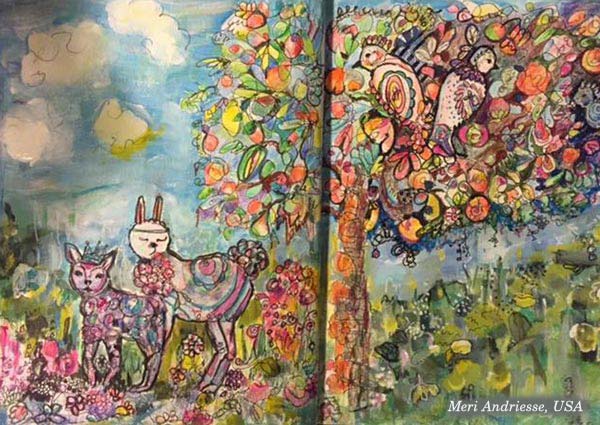
8) Connecting and Thoughtful
Sherry Pollack has whimsical style with lively lines but it’s also extremely thoughtful. It’s like every little creature has its’ own thoughts even if the creatures share the same experience. This makes it so easy to imagine being among them. It feels like I could listen to the same sounds, observe the same things and join the conversation that is more spiritual than outspoken.
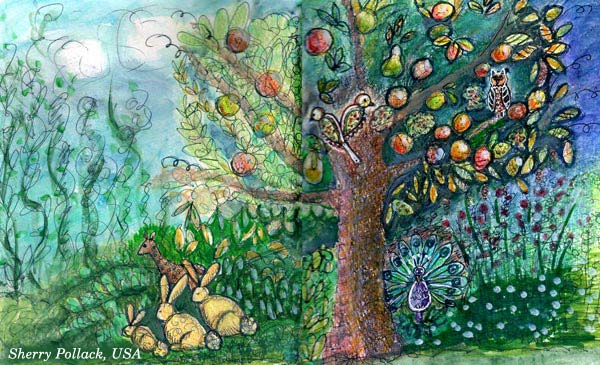
Flowing Greenery
When using the same mixed media techniques, how would your scene look like? This mini-course, Flowing Greenery, was published at “Imagine Monthly Spring 2016” art journaling class. It’s now available individually as a self-study class – Buy here!
You can also buy all the 6 monthly classes as a bundle. I will also release the classes individually one by one later this summer, and show more ideas on how to apply them.
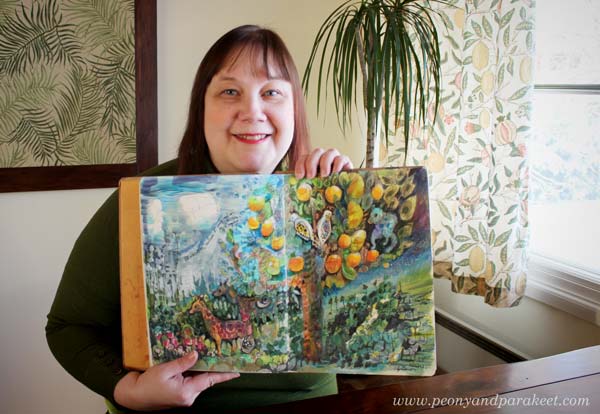
Create your own fruit trees and whimsical animals, right now!
Video: Full Art Journal Flip Through!

There are two special moments in art journaler’s life: starting a new art journal and finishing one. As the latter is much rarer, I am happy to announce that I have just finished this journal! I truly feels a small victory!
From Decorative to Expressive
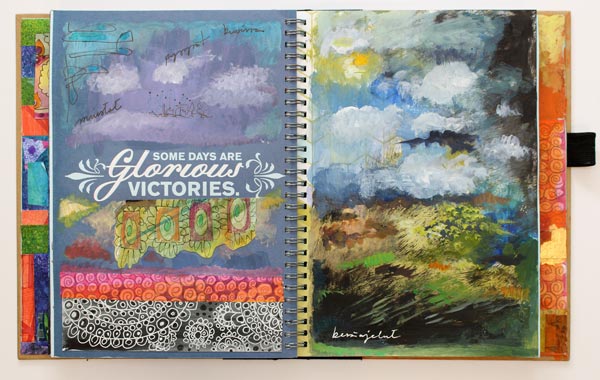
I purchased this Smash book in 2014 and intended to make it fashion and textile oriented. It has a lot of those, but also other stuff like little paintings, a few cards that I have wanted to save, and some collages that include photos. When I started this journal, I was very much into decorative style and the book has a lot of hand-decorated papers in it. Now, when I look back, I no longer see decorations as a self-purpose but a channel to move forward. Once I have got my imagination going, I have been able to move to create more expressive art.
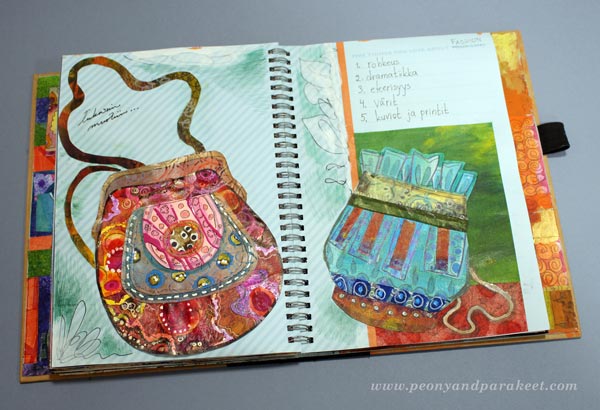
Art Journal Flip Through
Many pages of this art journal are a bit clumsy but I still wanted to celebrate the finished journal. I also think that this kind of “collage book” contains quite a lot of ideas that you can use in your art journal too. So I created a flip-through video for you to watch. Hopefully it will inspire you to art journal every week, even if it’s just one little circle on the corner of a page.
Go deeper into art journaling …
Imagine Monthly – Sign Up Now!
Create stunning art journal pages with techniques that expand your possibilities!
>> Sign up for Imagine Monthly Fall 2016
